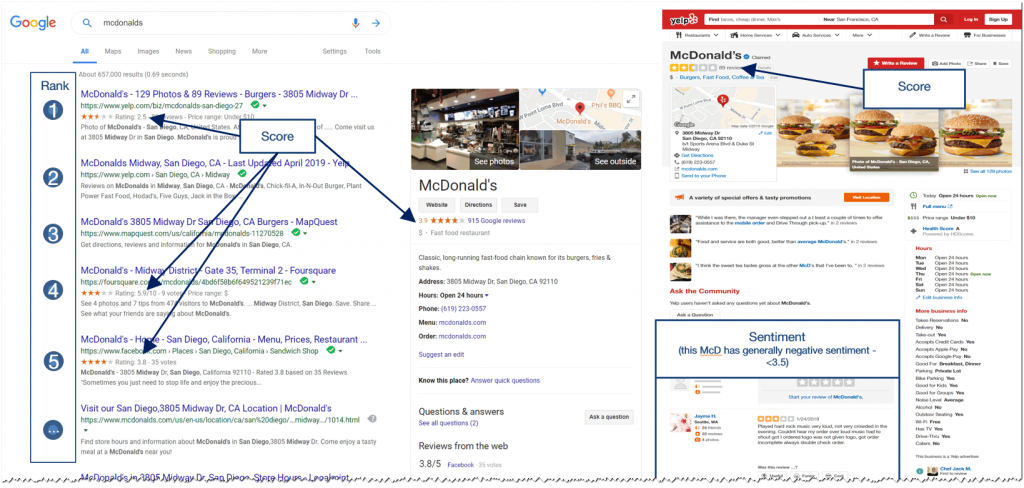April 25, 2019
This is the first part of a three-part series on reputation management. In this series we will give you all of the information and tools necessary to use this powerful tool to grow your business dramatically without spending thousands of dollars needlessly. Small business owners who ignore the importance of their online reputation may suffer from a drop in new business and never know what happened or why.
Part One: Your Reputation Today – Audit and Identify Opportunities
What do we mean by your online business reputation? In today’s world there are many tools available to potential customers to research a business online before deciding whether to buy goods or services from that business. The same tools used to research a business also allow customers to share information and feedback about their own experience with that business for others to use.
Some of the tools most frequently used by customers to research your business or comment on the experience they had with your services include Google, Yelp, Zillow, Angie’s List, Facebook, HomeAdvisor, LinkedIn, and even the good old Better Business Bureau. You may find reviews of your services on several different websites and depending on your specific profession there may be other websites like RateMyAgent, Realtor, TopHomeInspector, FindAppraiserToday, or Consumers’ Checkbook that also carry reviews of you and your business.
The reason your online business reputation is so important can be summed up by several fascinating (or frightening) statistics about how consumers make purchasing decisions when they need of the services of a real estate broker or agent, a home inspector, or an appraiser:
- Sixty-six percent (66%) of consumers accept and rely on the opinions of total strangers when making decisions about whom to hire—that is 2 out of every 3 customers.
- Ninety-seven percent (97%) of consumers conduct online research before even calling a service provider.
- Up to seventy-five percent (75%) of consumers have already decided whom they plan to hire before they even pick up the phone to call you.
Based on these statistics, it would be foolish for a small business owner today to rely on old-fashioned word of mouth or handing out flyers or business cards to find new business. Small businesses today MUST work on building and managing their online reputation. Failure to do so can be devastating. A single bad review can cost a small business up to 5% of annual revenue and multiple bad reviews can put a small organization out of business. On the flip side, one study revealed increasing your Yelp rating by a single star could lead to a 5-9% increase in your annual revenue.
So, how do you go about managing your online business reputation? The first step is to conduct an audit and an honest assessment of your own business, and the best way to start is with the granddaddy of all search engines – Google. No matter what search engine you personally use or prefer, start with Google since Google is estimated to handle well over 80% of all Internet searches. Google even powers several other search engines under a private label agreement, so Google is the place to start. Simply type your business name into the search bar, hit enter, and wait to see what pops up. As a side note, you will want to do this about yourself as well since customers often reference your name in a review and not the name of your business. By using Google, you can then focus your efforts in managing your business reputation by seeing which websites with comments about your business pop up on the first page of a Google search.
Next, make a list of the top 20 places where your business name or your name appear then click on each website listed and read what is being said about you and your business. Use this downloadable template with columns labeled Site, Rank URL / Web Address, Status, Sentiment, Score and Opportunities. Fill out the spreadsheet by entering the following information for each site you listed.
- Site = the name of the site where your business appears
- Rank = what number ranking is the page in the Google search results
- URL = the web address of each web page listed
- Status = indicate whether you or a 3rd party control or own each page
- Sentiment = determine if the information is positive, negative, or neutral
- Pay the most attention to the reviews that appear first because that’s what your prospective customers will see first. If you have several negative reviews stacked at the top, this would be a negative sentiment.
- As a rule of thumb, star-ratings below a 3.5 are perceived as negative by consumers. Scores around a 3.5 are neutral and scores above 4 are positive.
- Score = if a “star” rating is available, record the score here (IE “4.2”)
- Opportunities = take notes where you see opportunities to improve.
Here’s a sample (click to enlarge):
After building your spreadsheet, you will want to check on what reviews there are about you and your business. You can do this manually by going to the various websites that post reviews (listed above) or you can use a tool to help you find your reviews and see what others are saying about you and your business. Reputation Results is one tool you can use to find your business reviews.
List these reviews in your spreadsheet and note those that are favorable, what they say, and where they came from. Next, do the same for unfavorable reviews. Then ask yourself if you honestly are satisfied with what you found. If you wish there were more favorable reviews or if you simply wish there were more reviews, do not despair. Later in this series we will tell you how to get more (and better) reviews, what to do if you get a bad review, and how to take appropriate, corrective action to diminish its impact on your business.
Resist the urge to write reviews for your own business or have your friends and family write reviews. Most review sites have sophisticated tools to identify and delete fake reviews and may lock you out of your business pages if suspicious activity is detected. It’s not worth it! In the next two installments we’ll provide you with all the tools you need to grow your reputation online.
Now, congratulate yourself. You have started taking control of your online business reputation, something fewer than 25% of small businesses ever do. Good job!
Next, we want to address what impacts your online reputation. At the most basic level you need to have a good website for your business because you want your website to pop up first in a Google search. If a search for your business does not point to your own website, you are already losing revenue and just don’t know it. To make sure your website is “visible” you need to spend some time reading about search engine optimization or, in other words, how to get found on the Internet. One of the typical issues seen today is that a website is not updated to work on either a smartphone or a tablet. More and more people have given up desktop computers entirely and laptops are heading in the same direction. People use their smartphone or a tablet for an ever-increasing number of searches (as of 2016 more than half of all searches) so if your website is not updated and compatible with mobile devices, your search ranking will drop.
One other way to improve the impact your own website has on your search results and your business reputation is to add some interesting and relevant content about you and/or your business. For example, if you are a home inspector you could write a short monthly or quarterly tip on home maintenance and how it can help your home sail through a home inspection. You can also improve your online reputation and search results by posting testimonials on your website that you may have gotten in a handwritten note from a satisfied customer. Just be sure to get permission to use their name first…or post the review using only initials and the town; “RK from Poughkeepsie”. The more content related to your business that appears on your website, the higher your search rank and the businesses with higher search rankings get more customers. This is because most customers (over 90%) never go to the second page when looking at search results. Since customers know very little how search engines work, many perceive that the businesses featured on the first page of search results are the most reputable and respected so you want to be sure you do everything in your power to make it to the first page in a Google search.
In Part Two of this series we will cover how to enhance, set up, and manage your online presence effectively in a way that actually helps you get new business. Think of it as the online version of turning lemons into lemonade. Until then, you have your homework…to find out what your online reputation is today.
Sources:
https://edkentmedia.com/why-reputation-management-important/
https://www.reputationdefender.com/blog/orm/why-reputation-management-important-businesses
https://reputationrefinery.com/how-to-conduct-a-google-reputation-audit
https://boast.io/top-6-places-to-audit-your-online-business-reputation/
https://www.dreamhost.com/blog/how-to-optimize-your-site-for-mobile/
https://blog.hootsuite.com/social-media-tips-for-small-business-owners/



